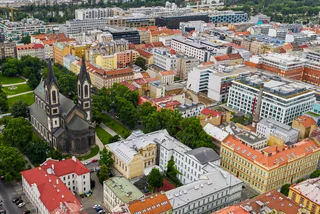How will Russia’s invasion of Ukraine affect the Czech economy? As the West imposes harsh sanctions to damage the Russian economy, effects are already being felt in the Czech Republic and throughout Europe, with consumers set to feel a significant hit in their wallets as a result of the turmoil.
Fuel prices in the Czech Republic have spiraled to their highest ever levels. Average petrol prices increased by CZK 1.93 last week, to an average of CZK 39.36 per liter. Diesel rose by CZK 2.34 in a single week, up to CZK 38.73 per liter. Analysts expect prices to break the CZK 40 mark in the coming days.
“Motorists in the Czech Republic must reckon with the fact that fuel prices will continue to rise dramatically in the coming days. The rapid rate of increase, in the case of petrol the fastest since 2010, may even accelerate,” said Lukáš Kovanda, Trinity Bank Chief Economist.
The dramatic rise is the result of higher oil prices on world markets. Another factor is the significant weakening of the Czech crown as a result of the Ukrainian war. In times of financial uncertainty, independent currencies such as the crown become a much riskier investment compared to the dollar or the euro.
A week ago, €1 bought CZK 24.74. Now, it buys CZK 25.65. This means the Czech Republic suddenly has much lower purchasing power for buying goods from abroad, which could lead to price rises throughout the economy including for everyday food and drink prices as well as other consumer items, from clothes to cars.
Wages won't rise to meet these higher costs in the short-term, so people up and down the country can expect to feel less well-off than they did before.
Another problem looming for the economy is the enormous quantity of raw materials normally imported from Russia. EU financial sanctions haven’t yet touched upon limiting imports for natural gas, or ore and metal imports. But apprehension that such measures could be taken is leading to a stockpiling of resources, resulting in major price hikes.
The price of gas for European markets rose to a record CZK 4,975 per megawatt-hour yesterday. “Natural gas will be one of the biggest pains for Europe this year and in the next few years. Housing, fertilizers, and also food will become more expensive. Many industries will not be able to exist with gas at these prices,” said Capitalinked.com analyst Radim Dohnal.
Multiple energy providers in Czechia went bankrupt last year as a result of a much smaller (but still very large) increase in wholesale gas prices. The much worse situation now means even more could go bankrupt, leaving customers stuck with disadvantageous emergency contracts.
Czech customers faced with the likelihood of increased living costs won’t be alone in Europe,though. Eurozone inflation accelerated to a record high of 5.8 percent in February, driven largely by the huge increase in energy prices. A Commerzbank economist told Politico.eu that “the next inflation shock is already looming in March.”
In the Czech Republic, inflation is even higher, hitting 9.9 percent in January, and economists are now certain that inflation will hit double figures in the next few months. Ukraine's brave resistance is inspiring people the world over; but economic fallout from the war means hard times also lie in store in Czechia.












 Reading time: 2 minutes
Reading time: 2 minutes 


























